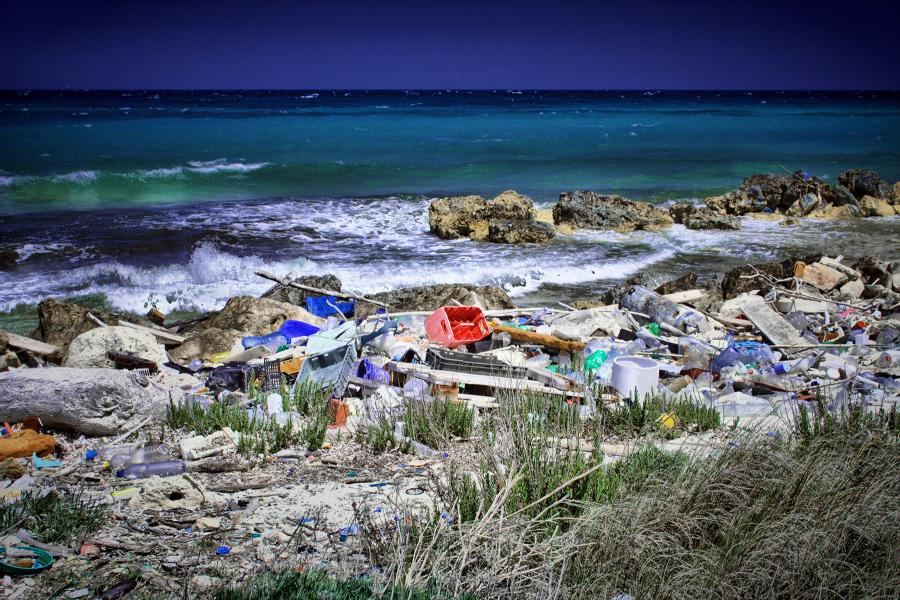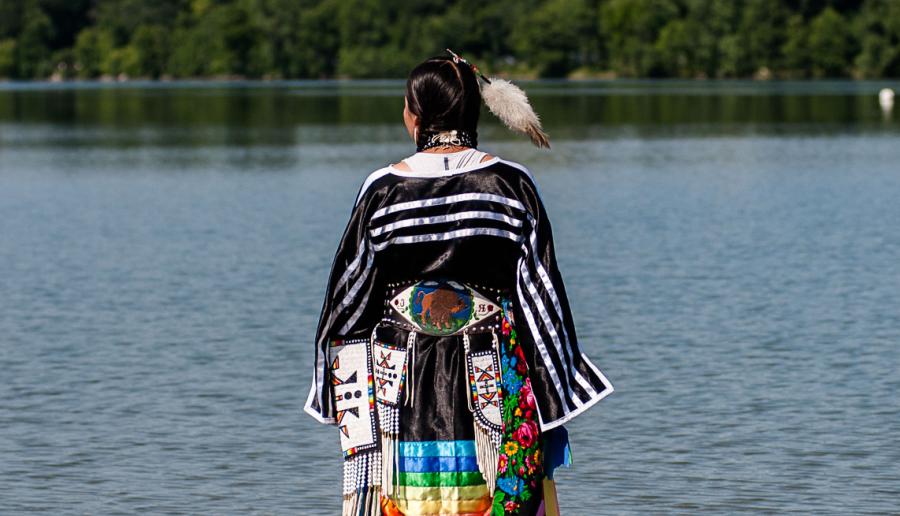
On May 20, the UN Permanent Forum on Indigenous Peoples (UNPFII) commenced its 12th annual session. The UNPFII is an advisory body to the Economic and Social Council (ECOSOC), with a mandate to discuss indigenous issues related to economic and social development, culture, the environment, education, health and human rights. The UNPFII was established by the UN in response to demands from Indigenous Peoples for a high level permanent body at the United Nations.
Every year, hundreds of Indigenous delegates and representatives attend the forum in hopes of bringing their plights to the forefront and influencing policy at the global and national level. This year Cultural Survival is participating in a number of levels, we have nineteen representatives present at the Forum. On Monday, May 20, 2013, Anselmo Xunic (Kachikel), Guatemala Community Radio Program Manager for Cultural Survival met with UN Special Rapporteur James Anaya about the plight of community radio in Guatemala. Currently Cultural Survival's community radio partners in Guatemala are fighting for their right to freedom of expression through community radio. A new bill in the Guatemalan congress, Bill 4479 would criminalize community radio with a penalty of up to 10 years in prison. This bill is a threat to dozens of community radio stations that base their existence on the promises made in the Guatemalan Peace Accords, the country’s own constitution, and the UN Declaration on the Rights of Indigenous Peoples. Xunic met with Special Rapporteur Anaya to bring this urgent matter to his attention. Cultural Survival’s Guatemala Radio Project works with a network of Indigenous community radio stations in Guatemala to promote Indigenous language, culture and human rights. Representatives from the network will be at the UN Forum to speak to community radio’s role in promoting language revitalization, the right to Free, Prior and Informed Consent, and urge for the legalization of community radio within Guatemala.
Side Sessions at the UNPFII:
Cultural Survival is also participating in a number of side sessions. On May 23, 10am-1pm at the Trusteeship Council Conference Building in partnership with Coordinadora Andina de Organizaciones Indígenas (CAOI), Conservation International, Cultural Survival is co-hosting a side session on the Right to Free, Prior and Informed Consent. Panelists will include Cultural Survival Deputy Executive Director Mark Camp, Cesar Gomez (Pocomam), FPIC Radio Series Producer Kaimana Bacarse (Native Hawaiian), and partners from our current advocacy campaigns in Guatemala and Belize: Maria Cristina Bernabé Hernandez (Q’anjobal), Alfredo Baltazar Pedro (Q’anjobal), Alfonso Caal (Q’eqchi), and Pablo Mis (Q’eqchi).
This event will kick off our new radio series on Free, Prior and Informed Consent as well as launch “Free, Prior and Informed Consent: Making Rights a Reality” an analysis publication of current FPIC standards in English and Spanish produced with Rainforest Foundation US. Please share widely. Download and air PSAs here!
On Friday May 24, 9am-10am, Cultural Survival’s Executive Director will be a panelist at “From aspiration to implementation: Practical lessons on using UNDRIP and advancing indigenous peoples’ rights” panel hosted by The Christensen Fund, The Ford Foundation, and Tamalpais Trust at the Ford Foundation.
On Wednesday May 29, 1:15-2:30pm, Cultural Survival’s radio partner Radio Ixchel will be hosting a side session “Freedom of expression: The case of indigenous community radio in Guatemala” in Conference Room 1 North Lawn Building. Panelists will include Anselmo Xunic (Kachikel), Guatemala Community Radio Program Manager for Cultural Survival, Mark Camp, Cultural Survival Deputy Executive Director, Maria Cristina Bernabé Hernandez (Q’anjobal), and Alfredo Baltazar Pedro (Q’anjobal), both from Santa Cruz Barillas, Guatemala.
On Thursday May 30, 1:15-2:30pm, as part of Smithsonian Center for Folklife and Cultural Heritage’s event “Our voices on the air: Community radio as a tool for language revitalization,” panelists will include Mark Camp, Cultural Survival Deputy Executive Director, Anselmo Xunic (Kachikel), Guatemala Community Radio Program Manager for Cultural Survival, and Kaimana Barcarse (Native Hawaiian), Cultural Survival FPIC Radio Series Producer.
Events part of Proud2BIndigneous Week:
Cultural is excited to be part of First Peoples Worldwide's #PROUD2BINDIGENOUS WEEK during the Permanent Forum. Since most Indigenous people will not make it to New York, First Peoples is running an online campaign to allow Indigenous peoples everywhere to engage with UNPFII and each other. Throughout the week, a coalition of 50+ organizations will be celebrating Indigenous people through stories, photos and videos on Facebook,Twitter and Youtube and sharing news from UNPFII. More importantly, First Peoples will be asking indigenous peoples to share photos and videos of themselves expressing why they are proud to be indigenous while holding a sign with the hashtag #Proud2BIndigenous and posting it to Facebook and Twitter.
Reception Honoring Dayamani Barla with the 2013 Ellen L. Lutz Indigenous Rights Award will take place May 23 at the Museum of the American Indian in New York. “Cultural Survival is honored to present Dayamani Barla, an Indigenous human rights activist and journalist from the Munda tribe in the Indian state of Jharkhand, with the 2013 ELL Indigenous Rights Award," says Cultural Survival Executive Director Suzanne Benally. Barla has been on the forefront of people’s movements against corporate and government-led land grabs and other injustices that threaten the survival, dignity, and livelihoods of Indigenous Peoples. “This prize is presented in recognition of outstanding human rights work, dedicated leadership for Indigenous Peoples rights, and a deep life commitment to protecting, sustaining, and revitalizing Indigenous cultures, lands, and languages,” says Benally. Barla was chosen from close to 60 nominees by a distinguished panel of Indigenous leaders.
Cultural Survival Bazaar comes to New York during the UNPFII on Friday May 24, 10am-6pm at Dag Hammarskjöld Plaza, 833 1st Ave. The Cultural Survival Bazaars are a series of cultural festivals that provide Indigenous artists, cooperatives, and their representatives from around the world the chance to sell their work directly to the American public. Hundreds of artists, cooperatives, and their representatives sell traditional and contemporary crafts, artwork, clothing, jewelry, carpets, and accessories at the Bazaars. In addition, the Bazaars offer a wide assortment of cultural performances and presentations, which include live music, Native American storytelling, craft-making demonstrations, films, as well as the chance to talk directly with guest artisans and community advocates.
Meet the delegates :
Guatemalan Community Radio Program Representatives:
Cultural Survival’s Guatemala Radio Project works with a network of Indigenous community radio stations in Guatemala to promote Indigenous language, culture and human rights. They will be at the UN Forum to speak to community radio’s role in promoting language revitalization, the right to Free, Prior and Informed Consent, and urge for the legalization of community radio within Guatemala.
Ancelmo Xunic (Kachikel)
Guatemala Community Radio Program Manager for Cultural Survival. In 1999, he helped found Radio Ixchel, the community radio station in Sumpango, Sacetepuequez. In addition to his duties with Cultural Survival, he continues to serve as the volunteer coordinator at Radio Ixchel. He also served as the treasurer of the village cooperative.
Cesar Gomez (Pocomam)
Cultural Survival FPIC Radio Series Producer & Content Production and Training Coordinator for the Cultural Survival Community Radio Project. Cesar is from Palin, Esquintla, Guatemala, a Pocomam Maya town located 25 miles from Guatemala City. Cesar worked for five years as a volunteer at the Palin community radio station. In 2005 he was selected as a regional representative to the Association of Guatemalan Community Radio Stations. In 2007, he was hired as the office administrator of the National Congress of Community Radios. In 2008, he joined Cultural Survival.
Program on Free, Prior and Informed Consent:
The goal of the project is to strengthen Indigenous peoples’ capacity to implement Free, Prior and Informed Consent by increasing awareness and understanding of this right through community media and community exchanges. Our objective is to build broad community awareness of the concept of Free, Prior and Informed Consent (through community media), while simultaneously developing deeper knowledge, skills and relationships among community leaders to prepare them to implement FPIC (through community exchanges).
Danielle DeLuca--Logistics and Distribution Coordinator
Kaimana Barcarse (Native Hawaiian):
Cultural Survival FPIC Radio Series Producer & Program Director and lead DJ of Alana I Kai Hikina on KWXX-FM, and director of the Honuakai Exploration Sciences and Voyaging Division of the 'Aha Punana Leo. The mission is to utilize the wa'a (canoe) as a platform to strengthen the Hawaiian language skills and cultural traditions of its participants. Barcarse is also an instructor at Ka Haka 'Ula O Ke'elikolani Hawaiian Language College of the University of Hawai'i at Hilo and is serving on the board of directors at The Cultural Conservancy.
Campaign Partners:
Community Organizers against Dams in Huehutenango, Guatemala
Spanish company Hidralia Energia has used violence and coercion in their attempts construct a dam in Santa Cruz Barillas despite the Q’anjobal Maya community’s vociferous disapproval. In May 2012 one community leader was shot and killed company security guards, which led off a month of martial law and military raids in the small town. Another local activist was kidnapped and murdered in April 2013 and the case is still being investigated.
Maria Cristina Bernabé Hernandez (Q’anjobal)
Community organizer against a Spanish dam near her home of Santa Cruz Barillas Guatemala. Her father was captured illegally by Guatemalan police and spent 6 months in prison without charges against him. She was elected by her Q’anjobal Maya community to speak on their behalf at the Forum.
Alfredo Baltazar Pedro (Q’anjobal)
Community activist vocal against the dam in Santa Cruz Barillas and developing dam projects in his home of Santa Eulalia Huehuetenango. He is an outspoken against the use of violence and repression by companies and the government against community activists, especially Indigenous activists. He will speak on the recent kidnap and murder of Daniel Pedro Mateo of Santa Eulalia.
Traditional Indigenous Authorities from Toldeo, Belize
A Texas-based US oil company has received a license for oil extraction within the Sarstoon Temash National Park in Belize, also lands traditionally and legally belonging to the Q’eqchi Maya. The communities are organizing to demand the company respect their right to free, prior and informed consent, especially in respecting local Maya leaders’ traditional authority.
Alfonso Caal (Q’eqchi)
President of the Toledo Alcaldes Association, which is the group of 78 traditional leaders or alcaldes who govern the 38 Maya villages of southern Belize in accordance with generations of tradition. He will address violations to his people’s right to free, prior and informed consent.
Pablo Mis (Q’eqchi)
A spokesperson for the Maya Leaders Alliance of Toledo, Belize. He has worked tirelessly to document and represent the various human rights violations against the Maya of Belize in front of government, UN officials, the Inter American Commission in Washington DC, and the Human Rights Council in Geneva.
Silver Mining in Wirikuta, Mexico:
The Wixarika or Huichol people have been organizing against silver mining in their sacred mountains called “Wirikuta” which is the third most biodiverse desert in the world and the home to the sacred Peyote plant. The government of Mexico has issued various mining licenses in the Wirikuta Nature Reserve to Canadian mining company First Majestic Silver.
Cilau Valdez (Huichol/ Wixarika)
Activist and traditional yarn painter, a traditional art form that was almost extinct before his father revived the tradition. He was selected as the youngest member of a delegation to go to Vancouver, Canada last year where he met with the president of First Majestic Silver. He will be participating in the Cultural Survival Bazaar and at the Forum as a representative of his people.
CS STAFF:



